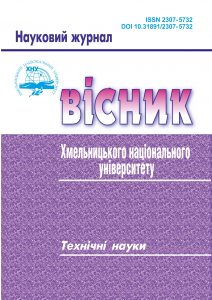ТЕМПЕРАТУРНО-НЕЗАЛЕЖНЕ ДЖЕРЕЛО ОПОРНОЇ НАПРУГИ ІНТЕГРАЛЬНИХ МІКРОСХЕМ З НИЗЬКОЮ НАПРУГОЮ ЖІВЛЕННЯ
DOI:
https://doi.org/10.31891/2307-5732-2023-327-5-126-131Ключові слова:
Джерело опорної напруги, КМОП технологія, температурна залежність, температурний коефіцієнтАнотація
Розглянуто принципи побудови джерел опорної напруги (ДОН) інтегральних мікросхем і шляхи досягнення їх температурної незалежності. Відмічена існуюча проблема реалізації якісного джерела напруги для сучасних мікросхем, що працюють з напругою живлення нижче 1 В, попит на які останнім часом стрімко зростає. Проаналізовано типову схему джерела опорної напруги, температурна незалежність якого базується на сукупному ефекті застосування вузлів з протилежною температурною залежністю. Розглянуто переваги і недоліки існуючих архітектурних рішень джерел опорної напруги. Показано, що причиною нестабільності і нелінійності вихідної опорної напруги при низьких значеннях напруги живлення є те, що принцип дії цих ДОН базується на властивості p-n переходу напівпровідника, і залежить від його так званої ширини забороненої зони, яка для кремнію становить 1,25В. Температурну залежність одного «плеча» ДОН вдається компенсувати протилежною температурною залежністю другого «плеча». Але при низьких напругах становляться відчутними нелінійності вищих порядків, що негативно позначається на якості результуючої вихідної напруги. Запропоновано інше архітектурне рішення побудови джерела опорної напруги із застосуванням двох ДОН, реалізованих на паразитних p-n-p і n-p-n біполярних транзисторах, що присутні у будь-якій КМОП технології, з наступним відніманням сформованих струмів за допомогою струмових дзеркал. В результаті вдається отримати температурно-незалежний результуючий струм і вихідна опорна напруга, що виділяється на вихідному резисторі, буде мати низьку температурну залежність, обумовлену лише температурною залежністю опору вихідного резистора. Таким чином вдається отримати джерело опорної напруги з низькою температурною залежністю, здатне працювати при напрузі живлення рівній або нижче 1 В. Дане рішення має можливість реалізації в стандартній КМОП технології виготовлення інтегральних схем. Запропоновані шляхи подальшого удосконалення системи.

